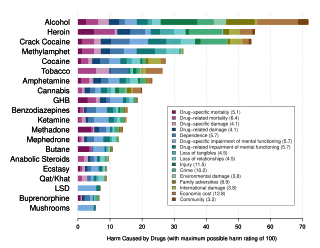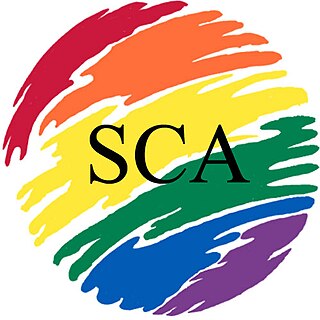Twelve-step programs are international mutual aid programs supporting recovery from substance addictions, behavioral addictions and compulsions. Developed in the 1930s, the first twelve-step program, Alcoholics Anonymous (AA), founded by Bill Wilson and Bob Smith, aided its membership to overcome alcoholism. Since that time dozens of other organizations have been derived from AA's approach to address problems as varied as drug addiction, compulsive gambling, sex, and overeating. All twelve-step programs utilize a version of AA's suggested twelve steps first published in the 1939 book Alcoholics Anonymous: The Story of How More Than One Hundred Men Have Recovered from Alcoholism.
Rational Recovery (RR) was a commercial vendor of material related to counseling, guidance, and direct instruction for addiction designed as a direct counterpoint to Alcoholics Anonymous (AA) and twelve-step programs.

Narcotics Anonymous (NA), founded in 1953, describes itself as a "nonprofit fellowship or society of men and women for whom drugs had become a major problem." Narcotics Anonymous uses a 12-step model developed for people with varied substance use disorders and is the second-largest 12-step organization, after 12-step pioneer Alcoholics Anonymous.

Drug rehabilitation is the process of medical or psychotherapeutic treatment for dependency on psychoactive substances such as alcohol, prescription drugs, and street drugs such as cannabis, cocaine, heroin, and amphetamines. The general intent is to enable the patient to confront substance dependence, if present, and stop substance misuse to avoid the psychological, legal, financial, social, and medical consequences that can be caused.
Overeating occurs when an individual consumes more calories in relation to the energy that is expended via physical activity or expelled via excretion, leading to weight gain and often obesity. Overeating is the defining characteristic of binge eating disorder.
A food addiction or eating addiction is any behavioral addiction characterized primarily by the compulsive consumption of palatable and hyperpalatable food items. Such foods often have high sugar, fat, and salt contents (HFSS), and markedly activate the reward system in humans and other animals. Those with eating addictions often overconsume such foods despite the adverse consequences associated with their overconsumption.
Pagans in recovery is a phrase, which is frequently used within the recovery community, to describe the collective efforts of Neopagans as well as Indigenous, Hindu, Buddhist, and other like-minded groups, to achieve abstinence or the remission of compulsive/addictive behaviors through twelve-step programs and other programs, such as Alcoholics Anonymous, Narcotics Anonymous, Overeaters Anonymous, Al-Anon/Alateen, etc. These efforts generally focus on modifying or adapting the twelve steps to accommodate the Pagan world-view as well as creating Pagan-friendly twelve step meetings either as part of a preexisting twelve-step program or as independent entities.

Marijuana Anonymous (MA) founded in 1989 is an organization and twelve-step program for people with common desire to maintain abstinence from marijuana.

Emotions Anonymous (EA) is a twelve-step program for recovery from mental and emotional illness. As of 2017 there were approximately 300 Emotions Anonymous groups active in the United States and another 300 around the world.
Overeaters Anonymous (OA) is a twelve-step program founded by Rozanne S. Its first meeting was held in Hollywood, California, USA on January 19, 1960, after Rozanne attended a Gamblers Anonymous meeting and realized that the Twelve Steps could potentially help her with her own addictive behaviors relating to food. OA has since grown, with groups in over 75 countries meeting in person, over the phone, and through the internet. OA is for people with problems related to food including, but not limited to, compulsive overeaters, those with binge eating disorder, bulimics and anorexics. Anyone with a problematic relationship with food is welcomed; OA's Third Tradition states that the only requirement for memberships is a desire to stop eating compulsively.

Sexual Compulsives Anonymous (SCA) is a twelve-step program for people who want to stop having compulsive sex. SCA founding is attributed variously to 1982 in New York City and to 1973 in Los Angeles. Although the fellowship originally sought to address issues of sexual compulsion among gay and bisexual men, and this is still the fellowships predominant demographic, today the program is LGBT friendly, open to all sexual orientations, and there is an increasing number of women and heterosexual men participating. SCA meetings are most likely to be held in urban areas with larger gay and bisexual male populations. The majority of members are white, but vary in age and socioeconomic background. The only requirement for membership is a desire to stop having compulsive sex.
Sex Addicts Anonymous (SAA) is a twelve-step program founded in 1977 for people who want to stop their addictive sexual behavior. There also exists a group known as COSA, for those who have been impacted by others' sexual addiction.
Nicotine Anonymous (NicA) is a twelve-step program founded in 1982 for people desiring to quit smoking and live free of nicotine. As of July 2017, there are over 700 face-to-face meetings in 32 countries worldwide with the majority of these meetings occurring in the United States, Iran, India, Canada, Brazil, the United Kingdom, Australia, Russia and in various online community and social media platforms.. NicA maintains that total abstinence from nicotine is necessary for recovery. NicA defines abstinence as “a state that begins when all use of nicotine ceases.
Drug addiction recovery groups are voluntary associations of people who share a common desire to overcome their drug addiction. Different groups use different methods, ranging from completely secular to explicitly spiritual. Some programs may advocate a reduction in the use of drugs rather than outright abstention. One survey of members found active involvement in any addiction recovery group correlates with higher chances of maintaining sobriety. Although there is not a difference in whether group or individual therapy is better for the patient, studies show that any therapy increases positive outcomes for patients with substance use disorders. The survey found group participation increased when the individual members' beliefs matched those of their primary support group. Analysis of the survey results found a significant positive correlation between the religiosity of members and their participation in twelve-step programs and to a lesser level in non-religious SMART Recovery groups, the correlation factor being three times smaller for SMART Recovery than for twelve-step addiction recovery groups. Religiosity was inversely related to participation in Secular Organizations for Sobriety.
Workaholics Anonymous (WA) is a twelve-step program founded circa 1983 for people identifying themselves as "powerless over compulsive work, worry, or activity" including, but not limited to, workaholics–including overworkers and those who suffer from unmanageable procrastination or work aversion. Anybody with a desire to stop working compulsively is welcome at a WA meeting. Unmanageability can include compulsive work in housework, hobbies, fitness, or volunteering as well as in paid work. Anyone with a problematic relationship with work is welcomed. Workaholics Anonymous is considered an effective program for those who need its help.

LifeRing Secular Recovery is a secular, non-profit organization providing peer-run addiction recovery groups. The organization provides support and assistance to people seeking to recover from alcohol and drug addiction, and also assists partners, family members and friends of addicts or alcoholics. It is an abstinence-based recovery program with three fundamental principles: sobriety, secularity and self-empowerment. The motto of LifeRing is "empower your sober self."

Food Addicts Anonymous (FAA) is a twelve-step program founded in 1987 that is patterned after the Alcoholics Anonymous program. It is for people with food addictions and is based on the premise that some people are addicted to refined high-carbohydrate foods and need to abstain from those foods in order to avoid overconsumption.

Pills Anonymous (PA) is a twelve-step program founded in 1972 for people who seek recovery from prescription drug addiction. PA is patterned very closely after Alcoholics Anonymous, although the two groups are not affiliated.







